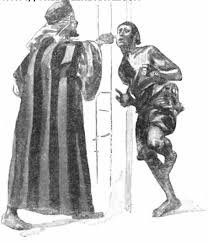Concerning the Treatment of Slaves by Hebrews
The first portion of this week’s Torah Reading deals with the issue of Hebrews owning slaves; particularly Hebrew slaves (Exo. 21:1-11) .
According to this passage, if a Hebrew acquires a Hebrew slave, they would serve that master for 6-years. In the 7th-year that slave would be freed. This is confirmed in Deuteronomy 15:12 which reads,
“And if thy brother, an Hebrew man, or a Hebrew woman, be sold unto thee, and serve thee six years; then in the seventh year thou shalt let him go free from thee” (KJV).
It would seem this ordinance involving the releasing of the Hebrew slave in the 7th month is not directly tied to the Shemitah.
It should be noted that the Hebrews failed to keep this ordinance according to Jeremiah 34:14.
Debt and Slavery
What would justify a Hebrew acquiring a Hebrew slave? The most likely reason is found in Matthew 18:25:
“But forasmuch as he had not to pay, his master commanded him to be sold, and his wife and children and all that he had and payment to be made” (KJV).
In this context, a Hebrew would acquire another Hebrew through unpaid debt.
Ancient Near Eastern custom facilitated that an individual who is in debt to another, be sold into slavery if that debtor is unable to pay off their debt. Torah, although not sanctioning or advocating the practice, established provisions for an individual who is in debt to another to be sold into slavery if the debtor is unable to pay his debt to the master.
Abba, in establishing ordinance regulating the treatment of Hebrew slaves, acknowledged the practice existed. However, Abba established time limits to the servitude. No Hebrew who was enslaved by another Hebrew could be forced into servitude for more than 6-years. That slave was to be released in the 7th year of their enslavement.
Yeshua Clarifies the Practice of Debt Slavery
Yeshua came to clarify Torah for us. In so doing, it was through parable that He taught that the debt owner always had the wherewithal and right to release or forgive his debtor’s debt (Matthew 18).
What Master’s parable teaches the Torah Observant Disciple of Yahoshua is that debt should ultimately be forgiven. No one who is indebted to us, as disciples, should be made to endure unending servitude or strung out debt to us. And this attitude should run across the board and be recognized by every disciple of Messiah.
More Than Material Debt and Slavery
Debt in this sense also transcends the material. Forgiveness is always a virtue that Father has shown to His beloved. The biggest and most pervasive debt we all owe is our sin debt. We are indebted to Father as a result of our sins. Yet Abba has provided a means whereby our debt can be forgiven. We in turn serve and obey Him for his forgiveness of our sin debt.
Likewise, we are compelled to forgive our fellow disciples any physical debts they owe us, as well as any trespasses committed against us by fellow believers.
Master instructed that we lend, hoping for nothing in return…(Luk. 6:35; NKJV).
If we harden our hearts towards those who owe us materially and on a relationship basis, then we stand the risk of not being forgiven by our Heavenly Father. In this regard, Yeshua in the Parable of the Unforgiving Servant stated:
“Then his lord (speaking of the master to the servant who refused to forgive his debtor), after that he had called him, said unto him, O thou wicked servant. I forgave thee all that debt, because thou desiredst me. Shouldest not thou also have had compassion on thy fellowservant, even as I had pity on thee? And his lord was wroth, and delivered him to the tormentors, till he should pay all that was due unto him. So likewise shall my heavenly Father do also unto you. If ye from your hearts forgive not every one his brother their trespasses” (Mat. 18:32-25; KJV).
The Making of a Bond Servant
Nevertheless, back to our Torah Reading passages: Father placed a provision in Torah whereby the servant who chooses to remain in permanent servitude to their master may willingly do so. Thus, the servant desiring bond servant status would be brought to the judgment-seat of God (according to the LXX) or to the judges (according to the KJV and other Authorized Versions) by that master. The purpose appears to be one of making the permanent servitude a publicly stated matter.

A Hebrew slave desiring to serve their master in perpetuity would undergo an ear piercing by an awl on that master’s doorpost.
Upon the conclusion of the proceeding at the judgment seat of God, the servant would then be brought to the door or door post of the master’s home. That servant’s ear would then be pierced by an awl (ie., a metal pointed tool used to punch holes in material like leather).
Thus, that servant would serve that master till the death of the master or of that of the servant (cf. Deu. 15:17).
A Shadow of Good Things to Come
This ordinance is clearly illustrated in our claiming perpetual servitude to YHVH our Elohim. Fortunate for us, Yahoshua Messiah was already pierced on our behalf having himself been judged on our behalf for our sins.

Falling in Love with Christmas all Over Again Part 1-STAR-74
Are we falling in love with Christmas all over again? This is part 1 of what i hope will be just a two part series on this issue. Christmas Posing A Crisis of Faith in the Hebrew Roots Community I believe our community is in, at a minimal, what I've chosen to call "a...
Compassion and Yeshua Messiah–Sabbath Thoughts and Reflections-73
Compassion and Yeshua Messiah Part 2 of my Divinity of Yeshua Messiah Series--Sabbath Thoughts and Reflections Episode 73 In this episode of Sabbath Thoughts and Reflections, I wish to examine the the Godly attribute of Compassion and Yeshua Messiah. This topic stems...
The Divinity of Yeshua Messiah-Part 1
The Divinity of Yeshua Messiah-Part 1 Sabbath Thoughts and Reflections-72 Visitor’s Comment on the Cepher Bible Episode A few weeks ago I received a comment from a visitor to themessianictorahobserver.org that I felt needed to be aired and discussed. The commenter was...
Sharing Hebrew Roots with Christians—The Lunar Sabbath Debacle—America Spotlighted in Deuteronomy 32
Sabbath Thoughts and Reflections Episode 70 Day of Atonement Just a day or so out from Day of Atonement (aka Yom Kippur)—a most solemn day of rest for our Faith where we fast and pray and reflect upon our lives and the past year. Prophets sight this Day of...
Are We Seekers of God or Torah Observers?
Sabbath Thoughts and Reflections-Episode-69 A Probing Question For this episode of Sabbath Thoughts and Reflections, I have been led to share a comment left by a visitor to our website. That comment--more a question than a comment I should say--seemed to call into...
Rejected by Family and the Hebrew Gospel of Matthew–Sabbath Thoughts and Reflections-68
Rejected by Family and the Hebrew Gospel of Matthew Sabbath Thoughts and Reflections-68 Master Yahoshua was rejected by the very people He grew up. All indications are that Master's hometown rejected His Messianic works and wisdom because they could not get past His...
A Broken Heart and Contrite Spirit Gets God’s Attention–Sabbath Thoughts and Reflections-67
A Broken Heart and Contrite Spirit Gets God's Attention A Question of Numbers--Affiliation--Religion--Or Something Else “With all the billions of people in the world—believers and non-believers alike—what makes me stand out from all the others? What makes...
Hollywood and Atheism
Hollywood and Atheism Atheism is Alive and Well in Hollywood I came across an article the other day that just solidifies for me how shallow some of the more elite of us are in our western society. When it comes down to the question of "do you believe in God?" I...
How Must We Deal with a World that is in Chaos–Sabbath Thoughts and Reflections–Episode 66
How Must We Deal with a World that is in Chaos? Sabbath Thoughts and Reflections—Episode 66 Vanity of Vanities for all is Vanity! Well, unless you’ve been completely off the grid—that is, in complete seclusion without access to news of any sort—you are no doubt...
Will the True God of the Old Testament Please Stand-Up–Sabbath Thoughts and Reflections–65
Will the True God of the Old Testament Please Stand-Up? The so-called God of the Old Testament: This is somewhat of the focus of this episode/post. As I completed chapter 24 of Deuteronomy in my Torah studies this week, I came to realize that we serve a most loving...

0 Comments